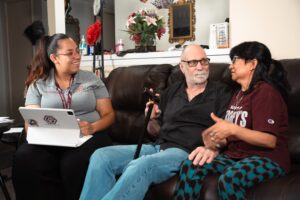Revolutionizing Medical Education: Roseman University’s GENESIS Program Builds Community-Centered Physicians

This article is included in the Spring 2025 print edition of Roseman University’s SpectRUm magazine.
In a bold departure from traditional medical education, Roseman University College of Medicine is pioneering a revolutionary approach to training future physicians through its innovative GENESIS program. Following the granting of preliminary accreditation in February by the Liaison Committee on Medical Education (LCME), the College of Medicine is actively recruiting its inaugural class of 60 students set to begin in July, with GENESIS serving as a cornerstone of their educational journey.
GENESIS represents a fundamental shift in how medical students learn about healthcare delivery by immersing them directly in underserved communities throughout their education. Officially launched in March 2022 on the steps of Las Vegas City Hall, the program has already made significant strides in community engagement and healthcare delivery.
Beyond the Classroom: Medicine in Real Communities
Unlike conventional medical programs that might offer occasional community clinic experiences or optional social medicine electives, GENESIS makes community engagement mandatory and longitudinal.
“Roseman GENESIS affords all undergraduate medical students with a longitudinal relationship with members of medically underserved communities,” explains Dr. Steven Embley. Chair of the Department of Clinical Sciences. “GENESIS is a required element of the curriculum that reinforces classroom topics such as clinical skills, medical ethics, social determinants of health, and health systems science.” This approach acknowledges a critical reality often overlooked in traditional medical training: that 80-90 percent of disease outcomes stem from social determinants of health rather than purely biological factors.
“There is a consensus in the literature that a larger percentage of healthcare outcomes is attributable to non-biologic causes such as the social determinants of health,” notes Embley. “Despite the overwhelming evidence of this phenomenon, medical education has been slow to adapt its curricula to reflect this reality. Recent changes in accreditation standards now include requirements that topics on the social determinants of health be taught to medical students, however, guidance on the structure or format have been varied across medical schools.”
A Household-Centered Approach
 What makes GENESIS truly distinctive is its household-centered methodology. Students are assigned to medically underserved households with whom they’ll work throughout their education, helping to improve both health and social conditions. They’re supported by GENESIS community health workers employed by the College of Medicine who help household members navigate appropriate health and social services.
What makes GENESIS truly distinctive is its household-centered methodology. Students are assigned to medically underserved households with whom they’ll work throughout their education, helping to improve both health and social conditions. They’re supported by GENESIS community health workers employed by the College of Medicine who help household members navigate appropriate health and social services.
“Community health workers are charged with recruiting, screening and enrolling households into the program,” explains Pearl Paulo, Senior Program Manager. “These community health workers educate household members about the experience of working with our medical students and their faculty supervisors. If a household agrees to be assigned to a medical student, then the community health worker introduces the household members to their assigned medical student and faculty supervisor.”
The program meticulously tracks nine domains of social determinants of health risk: income, nutrition, housing, technology, transportation, employment, and life skills/education, along with physical and mental quality of life measures.
“GENESIS uses a digital social risks profile system to longitudinally track the social condition of each household and its members,” shares Paulo. “The system also enables GENESIS teams to create care plans, track services provided, as well as visualize progress.”
“The goal is to transform risks into assets or protective factors that will serve to reduce the likelihood that the next life event experienced by the household does not reverse any improvements achieved,” notes Dr. Luther Brewster, Senior Executive Dean for Community Health Innovation. “The process of helping households address their social determinants of health risks towards a goal that exists beyond simply relying on public assistance is termed resilience building. It is our hope that a GENESIS household does not experience the common rebound effect of public assistance, whereby households are continuously exiting and rejoining the public assistance roles.”
Building Trust Through Community Partnership
GENESIS didn’t materialize overnight. Since the 2022 program launch, community health worker teams have been the backbone of the initiative’s success.
 “The entire GENESIS program is built on a foundation of trust,” emphasizes Sheyla Pierre, Director of Equity Development and Community Engagement. “We have hired several staff members from the very communities we serve, demonstrating our commitment to reinvesting in and uplifting underserved populations.”
“The entire GENESIS program is built on a foundation of trust,” emphasizes Sheyla Pierre, Director of Equity Development and Community Engagement. “We have hired several staff members from the very communities we serve, demonstrating our commitment to reinvesting in and uplifting underserved populations.”
This foundation of trust has yielded impressive results: more than 120 community organizations have referred households to GENESIS, resulting in over 500 Southern Nevada residents actively receiving services. In the past year alone, GENESIS led or participated in 160 community outreach events across the Las Vegas Valley.
“Community organizations are relied upon for household referrals, thereby making the entire GENESIS program vulnerable to the community. This approach ensures that GENESIS is always being responsive to the needs of the community,” adds Pierre.
The program maintains a diverse staff fluent in multiple languages, including English, Spanish, Tagalog, French, and Haitian Creole, helping to bridge potential cultural and socioeconomic barriers.
“GENESIS maintains a very diverse staff from multiple socioeconomic backgrounds,” Pierre explains. “The GENESIS staff undergo continuous training and four times per year engage in ‘refreshers’ to address the mental strain that accompanies providing services to medically underserved residents. Trainings often include staff and leadership from many of the community organizations that refer households and have extensive experience navigating the cultural, and socioeconomic barriers encountered in these households.”
Learning Communities and Population Health
Students participating in GENESIS are assigned to one of six learning communities, promoting student connectedness and faculty mentorship opportunities. These communities also serve a crucial educational purpose.
“GENESIS will leverage these learning communities as a means of consolidating data gathered on all households assigned to students in a given learning community,” explains Dr. Karin Esposito, Senior Executive Dean for Academic Affairs. “This will provide students in each learning community with a population-level view of the risks, needs and assets of all households assigned to students in a specific learning community. This approach will be used to reinforce skills related to population health, preventive health and health disparities.”
These collaborative experiences extend beyond individual household visits, as Esposito notes: “Periodically there are classroom sessions allocated for all members of the GENESIS team – students, faculty and community health workers to review the household’s care plan, progress made and any barriers that need to be addressed.”
Unexpected Benefits and Challenges
The program’s implementation has revealed both unforeseen benefits and challenges.
“The most pronounced unexpected benefit has been the number of household referrals we have received from other households,” shares Pierre. “Currently household to household referrals constitute a little more than 10% of our total referrals. This suggests that GENESIS staff are building significant trust in the community that is being rewarded by households sharing a trusted brand.”
The program has also encountered challenges: “An unexpected challenge has been responding to the intensity of requests for GENESIS to be offered in the rural areas of Nevada,” acknowledges Pierre.
Shaping Future Physicians
While GENESIS doesn’t aim to dictate medical specialty choices, it does aspire to fundamentally shape how Roseman graduates approach medicine regardless of specialty.
“It is our hope that the lasting impact of GENESIS on Roseman College of Medicine graduates is: 1) the importance of being a highly competent physician that communities can rely upon, 2) part of being a highly competent physician is the number of variables (social and medical) you leverage in making a diagnosis and treatment plan, 3) an understanding of the micro and macro policies that influence patient decision-making,” explains Esposito.
“It may have no effect on specialty selection, and that is fine,” Esposito adds. “Underserved communities need compassionate, ethically trained surgeons, ophthalmologists, dermatologists, psychiatrists and all other specialties. The goal is not necessarily to dictate specialty choice, but instead to ensure our students arrive to their residency as a highly competent physician as defined by the Roseman standard.”
GENESIS-trained physicians will gain “a comprehensive understanding of the context and conditions from which patients originate. This skill is derived from firsthand experience in communities and households, rather than through simulations, cases or windshield views of areas in need.”
Looking Forward
As Roseman University College of Medicine welcomes its first class of medical students, GENESIS is poised for continued growth and innovation. Future plans include expanding into Nevada’s rural and frontier communities and creating more pathways for students from other health professions to participate.
“Future cohorts of students will be welcomed into an ever-increasing environment of innovation that will ultimately spur student-driven ideas of how GENESIS can elevate its learning opportunities, scientific discovery and community benefit,” Brewster envisions. “This process will inevitably create more pathways for students from other professions (e.g., Pharmacy, Dental) and potentially other universities to participate in GENESIS.”
Looking to the future, Brewster projects: “We fully expect to have some version of GENESIS offered to several of Nevada’s rural and frontier communities. This would include the formation of statewide strategic partnerships aimed at ensuring that Nevada has a durable means of training a growing interprofessional healthcare workforce prepared to deliver high-quality healthcare to all its residents.”
The scalability of the program is already evident: “GENESIS is itself a replication of work pioneered in South Florida and therefore the evidence of its scalability already exists. The underlining approach, household-centered care, is a flexible approach able to accommodate a broadly accepted philosophy assigned to community health interventions – if you have seen one community, then you have seen one community. No two communities are the same and therefore strategies must be flexible enough to adapt to changing community contexts and conditions,” said Brewster.
With the LCME’s stamp of approval and recruitment underway for the inaugural class, Roseman University College of Medicine stands ready to transform medical education through its commitment to community engagement and addressing the social determinants that profoundly impact health outcomes.
“Implementing audacious approaches to address long-standing profession and societal challenges requires an unyielding focus on the desired outcome, while resisting the pressure to react to momentary setbacks or ‘pre-successes,'” reflects Brewster. “GENESIS is fortunate to be part of a College of Medicine that is supremely focused on its mission and to be part of Roseman University, with a legacy of audacious accomplishments.”